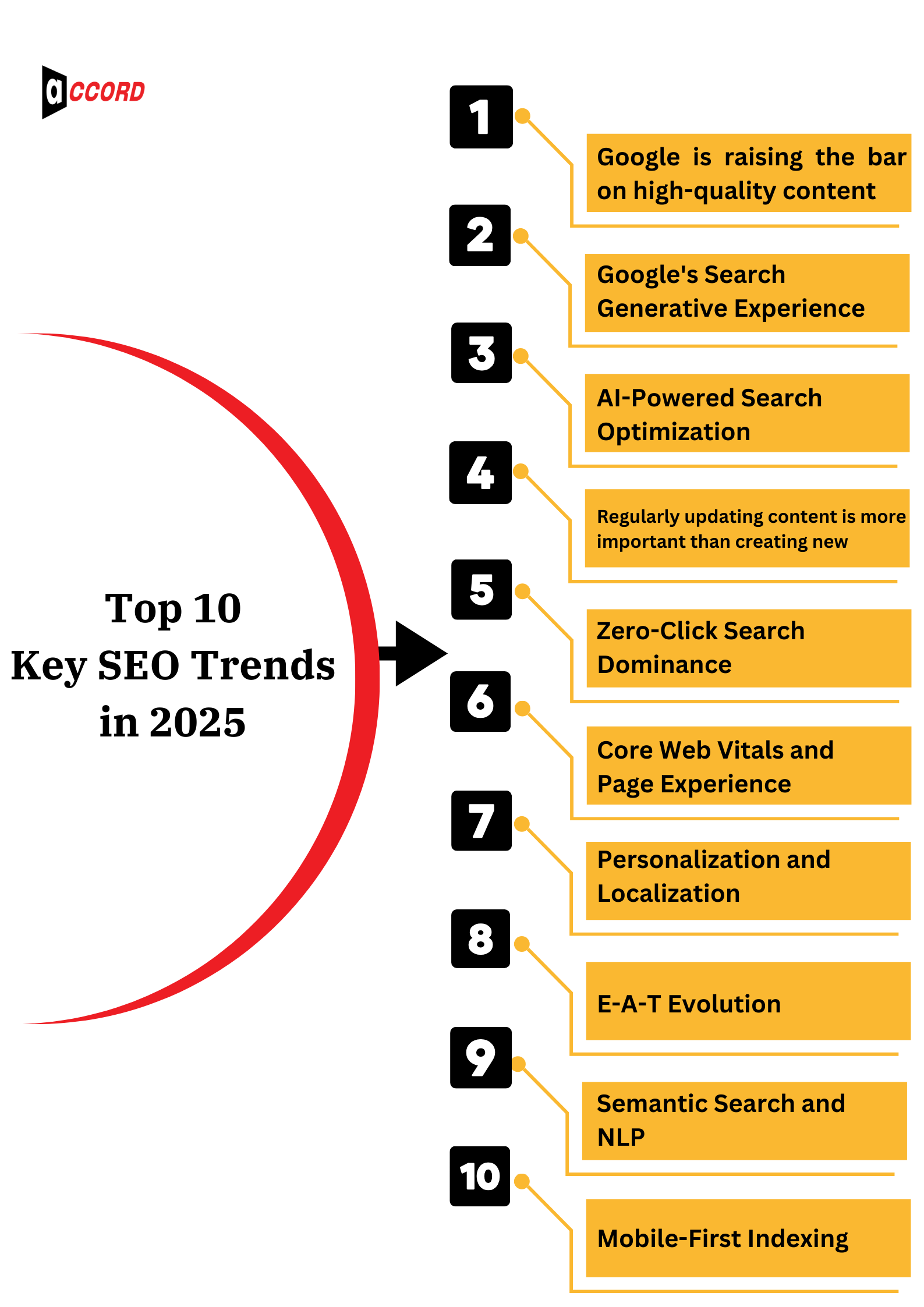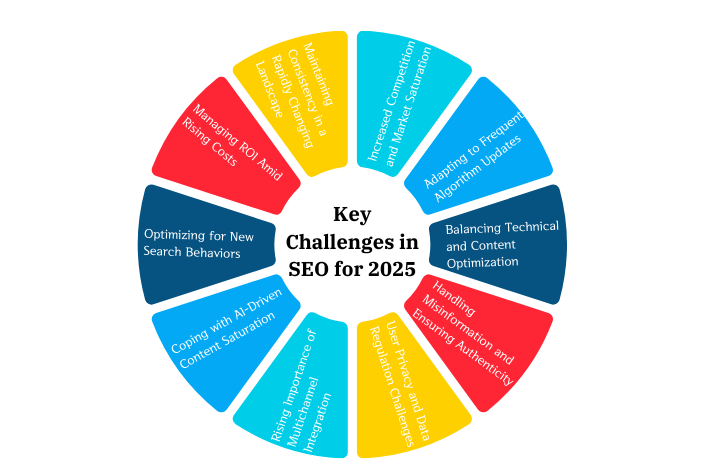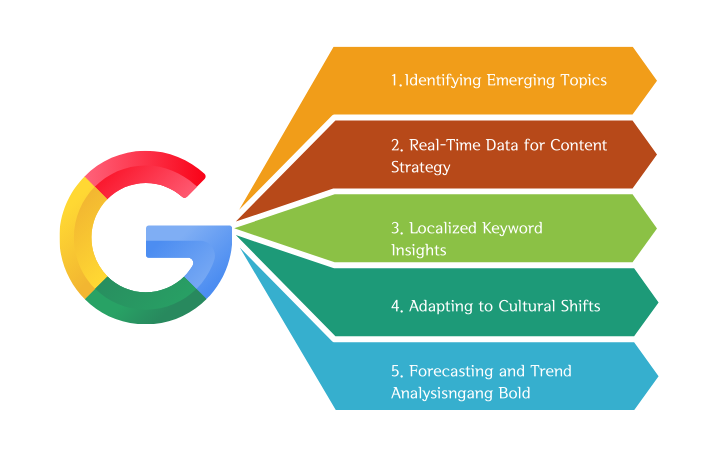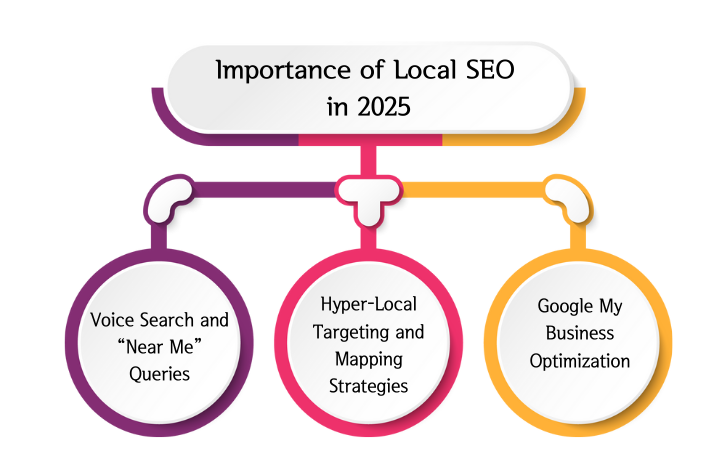Currently, this digital world is updating at such a fast pace that it is becoming difficult to make a strong position. So to make a strong position for yourself or your business, you have to stay updated with the times. Otherwise, this digital ecosystem will lose itself. As 2024 ends, 2025 will see some challenging updates to the digital ecosystem. Search Engine Optimization (SEO) is constantly updating, search engines are refining their algorithms, and user behavior is constantly changing. Search engine optimization (SEO) in 2025 is not just a technical practice but a dynamic blend of art and science, driven by ever-evolving algorithms, user behavior, and technological advancements. This article explores the emerging trends, challenges, and tools shaping SEO in 2025, providing actionable insights to future-proof your strategy.
Top 10 Key SEO Trends in 2025
As we look ahead to 2025, the world of SEO is set to evolve quickly. Keeping pace with emerging trends is crucial to stay competitive and maintain visibility in the ever-changing digital landscape. Here are 10 key SEO trends to focus on in 2025:
- Google is raising the bar on high-quality content
- Google's Search Generative Experience (SGE) is on the rise
- AI-Powered Search Optimization
- Regularly updating content is more important than creating new
- Zero-Click Search Dominance
- Core Web Vitals and Page Experience
- Personalization and Localization
- E-A-T Evolution (Expertise, Authoritativeness, Trustworthiness)
- Semantic Search and NLP
- Mobile-First Indexing

Google is Raising the Bar on High-Quality Content
Google continues to prioritize content that provides value, expertise, and aligns with user intent. Thin, repetitive, or generic content is penalized, emphasizing the need for in-depth, well-researched, and unique resources.
Google's Search Generative Experience (SGE) is on the Rise
SGE integrates AI into search, providing more dynamic, conversational, and context-driven results. This shift requires brands to optimize for generative AI answers by focusing on structured data, semantic optimization, and high-quality snippets.
AI-Powered Search Optimization
AI tools are shaping the future of search. Both search engines and marketers are leveraging AI for enhanced understanding of user behavior, trends, and intent. Tailoring content to align with these AI-driven insights is crucial.

Regularly Updating Content is More Important Than Creating New
Keeping existing content relevant, accurate, and aligned with current trends is now more impactful than creating new content. Regular updates help maintain rankings, signal freshness to search engines, and improve user satisfaction.
Zero-Click Search Dominance
Zero-click searches—where users find answers directly on the SERP—are becoming more prevalent. This trend requires businesses to focus on featured snippets, knowledge graphs, and concise, actionable answers.
Core Web Vitals and Page Experience
User experience metrics like page load speed, interactivity, and visual stability remain critical for rankings. With mobile and desktop experiences prioritized equally, meeting Core Web Vitals standards is non-negotiable.
Personalization and Localization
Personalized search results and localized content are increasingly important. Users expect tailored experiences based on their preferences, location, and context, making localized SEO and customer segmentation vital.
E-E-A-T Evolution (Experience, Expertise, Authority, Trustworthiness)
Google’s emphasis on credibility has grown with the addition of “Experience” to E-A-T. Demonstrating firsthand experience, backed by expertise and trust signals, will influence rankings more than ever.
Semantic Search and NLP (Natural Language Processing)
Search engines are better at understanding the context and intent behind queries. Semantic search optimization requires well-structured content, clear topics, and connections between related ideas.
Mobile-First Indexing
With mobile devices dominating search traffic, Google continues to prioritize mobile-first indexing. Ensuring your site is optimized for mobile usability and performance is critical for staying competitive.
Key Challenges in SEO for 2025

The dynamic nature of SEO makes it an ongoing challenge for businesses and marketers. In 2025, these hurdles will be more complex as the digital ecosystem evolves, creating both obstacles and opportunities for those willing to adapt. Here are the key challenges expected to dominate SEO in 2025:
Increased Competition and Market Saturation
With more businesses realizing the importance of SEO, the online space is becoming overcrowded. This intensifies competition across industries, making it harder for brands to stand out in search engine rankings. Smaller companies face the additional challenge of competing against established players with larger budgets and resources.
How to Overcome This:
- Focus on niche markets to avoid directly competing with industry giants.
- Embrace creativity and innovation to craft unique, user-centric content.
- Invest in storytelling and brand differentiation to resonate with your target audience.
Adapting to Frequent Algorithm Updates
Search engines like Google are continuously refining their algorithms to enhance the relevance and quality of search results. While these updates improve user experiences, they pose a significant challenge for SEO professionals who must quickly adapt to changes.
How to Overcome This:
- Stay informed by following reputable SEO news sources and forums.
- Conduct regular website audits to identify and address vulnerabilities.
- Diversify your SEO strategy to minimize risks associated with a single ranking factor.
Balancing Technical and Content Optimization
The growing importance of technical SEO, such as Core Web Vitals, alongside content optimization, creates a balancing act. Businesses must ensure their websites are both technically sound and filled with engaging, high-quality content.
How to Overcome This:
- Work closely with developers to address technical SEO issues.
- Use tools like Google Page Speed Insights to monitor and improve site performance.
- Develop a comprehensive content strategy that aligns with technical SEO requirements.
Handling Misinformation and Ensuring Authenticity
The rise of misinformation poses a challenge to content creators aiming for credibility. Search engines are increasingly prioritizing trusted, factual sources, making it crucial to produce authentic content.
How to Overcome This:
- Fact-check all information using credible sources before publication.
- Build trust through transparency, author bios, and references to authoritative studies.
- Monitor online discussions to correct any misinformation about your brand.
User Privacy and Data Regulation Challenges
As privacy concerns grow, search engines and governments are tightening regulations on data collection and tracking. Updates like Google's shift away from third-party cookies complicate audience targeting and personalization efforts.
How to Overcome This:
- Transition to first-party data collection through tools like customer surveys and newsletter signups.
- Respect user privacy by being transparent about data use and obtaining consent.
- Develop creative strategies that don't rely heavily on user tracking, such as contextual targeting.
Rising Importance of Multichannel Integration
SEO no longer operates in isolation. To achieve success, brands must integrate SEO with social media, email marketing, and paid campaigns. Managing these cross-channel efforts can be challenging.
How to Overcome This:
- Create a unified marketing strategy where each channel complements the other.
- Use analytics tools to track cross-channel performance and optimize accordingly.
- Focus on delivering a consistent brand message across all platforms.
Coping with AI-Driven Content Saturation
The proliferation of AI tools for content creation has led to a surge in similar, machine-generated content. Standing out amidst this flood requires a unique, human touch.
How to Overcome This:
- Prioritize original, creative content that adds value beyond AI capabilities.
- Leverage storytelling, personal experiences, and niche expertise.
- Use AI tools as a supplement rather than a substitute for human input.
Optimizing for New Search Behaviors
The rise of voice, video, and visual search is shifting how users interact with search engines. Traditional SEO strategies may fall short in addressing these new behaviors.
How to Overcome This:
- Optimize for voice search with conversational keywords and FAQ-rich content.
- Focus on high-quality visuals with descriptive alt text for visual search.
- Ensure video content is searchable with captions, transcripts, and appropriate metadata.
Managing ROI Amid Rising Costs
As SEO becomes more competitive, the cost of high-quality content, tools, and expertise rises. Measuring return on investment (ROI) and justifying SEO expenses to stakeholders is an ongoing challenge.
How to Overcome This:
- Track ROI using clear metrics, such as conversions, revenue, and engagement.
- Prioritize strategies that yield long-term value, such as evergreen content.
- Set realistic budgets and focus on scalable SEO practices.
Maintaining Consistency in a Rapidly Changing Landscape
The fast-paced nature of the digital world means SEO strategies must evolve continually. Maintaining consistency while embracing change is a daunting task.
How to Overcome This:
- Develop a flexible SEO strategy that allows for experimentation and quick pivots.
- Regularly train your team on the latest trends and technologies.
- Commit to continuous improvement by monitoring analytics and adjusting your approach.
Role of Google Trends in 2025

-
Identifying Emerging Topics
Google Trends remains a vital tool for spotting emerging search trends and consumer interests. It provides valuable insights into seasonal spikes and long-term patterns. -
Real-Time Data for Content Strategy
Marketers use Google Trends to align content creation with real-time user demands, enabling them to stay relevant and timely. -
Localized Keyword Insights
Regional data from Google Trends supports hyper-local SEO strategies, helping businesses adapt to specific market nuances. -
Adapting to Cultural Shifts
As user behavior evolves, Google Trends helps businesses stay ahead of cultural and societal changes, informing both SEO and branding strategies. -
Forecasting and Trend Analysis
Leveraging historical data from Google Trends allows brands to predict future keyword performance and refine long-term SEO strategies.
Challenges SEO Professionals Face in 2025
Increased Competition and Market Saturation
As more businesses invest in SEO, standing out requires innovative strategies and niche targeting.
Adapting to Algorithm Updates
Algorithm changes are more frequent and sophisticated, requiring constant vigilance and adaptability.
Handling Misinformation and Ensuring Authenticity
In an era of misinformation, maintaining credibility through verified content becomes vital for sustaining rankings.
The Role of AI in SEO Evolution
Content Creation with AI Tools
AI-powered content generation tools streamline the process of creating optimized, engaging content. These tools analyze user intent, identify high-performing keywords, and even suggest content structures, enabling faster and more efficient production.
AI-Driven Analytics and Strategy Formulation
AI is revolutionizing how SEO professionals approach data. Advanced AI analytics tools provide insights into user behavior, competition analysis, and performance tracking, allowing marketers to craft data-driven strategies.
Ethical Considerations in AI Use
While AI offers numerous benefits, its misuse—such as creating low-quality, mass-generated content—poses risks. Ethical practices, including transparency and human oversight, ensure AI-driven efforts align with user expectations and search engine guidelines.
Importance of Local SEO in 2025

Voice Search and “Near Me” Queries
As voice search adoption grows, localized queries like “best coffee shop near me” demand attention. Optimizing for these searches involves leveraging natural language and updating local business listings.
Hyper-Local Targeting and Mapping Strategies
Businesses are focusing on hyper-local SEO to target specific neighborhoods or regions. Using geotags, localized keywords, and community-driven content helps improve visibility in smaller markets.
Google My Business Optimization
A well-maintained Google My Business profile is essential for local SEO success. Regular updates, customer reviews, and engaging posts increase a business’s likelihood of appearing in local search results.
Measuring Success in 2025
Evolving SEO Metrics and KPIs
Traditional metrics like keyword rankings and organic traffic remain important, but newer indicators such as engagement rates, dwell time, and content shares are gaining prominence.
ROI Tracking and Attribution Models
With advanced tools, businesses can now attribute specific actions to SEO efforts. ROI tracking ensures that marketing budgets are effectively allocated for maximum impact.
Importance of A/B Testing
Experimenting with different headlines, meta descriptions, and calls-to-action through A/B testing allows SEO professionals to refine strategies based on performance data.
SEO Tools and Platforms for 2025

AI-Powered SEO Tools
AI tools like ChatGPT and RankMath automate content creation, keyword analysis, and on-page optimization, helping marketers save time and resources.
Emerging Platforms and Technologies
Platforms such as voice-activated assistants and AR-powered search experiences are reshaping SEO, demanding that businesses stay ahead of technological advancements.
Enhancing Productivity with Automation
Automation tools manage repetitive tasks like reporting, rank tracking, and backlink audits, enabling professionals to focus on strategic initiatives.
Future-Proofing Your SEO Strategy
Building a Flexible and Adaptable SEO Plan
The key to long-term success lies in adaptability. Regularly revising your strategy to align with new trends and algorithm updates ensures sustained growth.
Regular Training and Skill Upgrades
SEO professionals must stay informed through continuous learning. Attending webinars, enrolling in courses, and participating in industry events are excellent ways to enhance skills.
Leveraging Partnerships and Collaborations
Collaborating with influencers, industry experts, and other businesses can amplify your reach and strengthen your authority in the market.
Conclusion
SEO in 2025 is a dynamic blend of technology, user-focused design, and strategic adaptability. By embracing AI tools, prioritizing user experience, and staying informed through tools like Google Trends, businesses can navigate the challenges and capitalize on emerging opportunities. Those who succeed will be the ones who balance technical expertise with an empathetic understanding of user needs.
